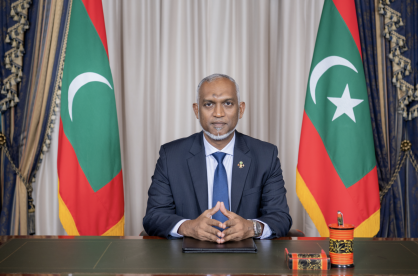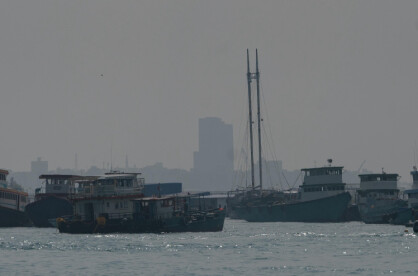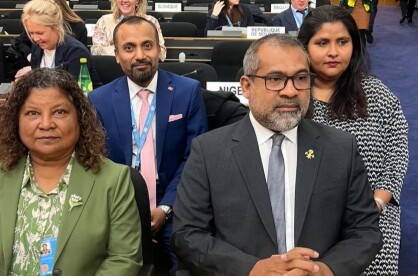Minister of Finance Ibrahim Ameer inherited a public finance machinery, based on consistent fiscal deficits year-on-year, despite past finance ministers having been technocrats like him. President Solih was sworn-in on 17 November 2018, and Ameer was immediately made the finance minister. The year ended with eight percent growth, 1.4 million tourist arrivals, and MVR22 billion in government revenue. The year 2019 was a record year with 1.7 million tourist arrivals, and MVR23 billion in total government revenue — the highest recorded revenue in the history of the Maldives — yet the year ended, somewhat astonishingly, with a MVR5.7 billion (6.6 percent of GDP) budget deficit.
The following year, with the COVID-19 pandemic having an adverse effect on the tourism industry and the overall economy of the country, revenue plunged to MVR14.7 billion, and GDP declined by 29 percent. This did not stop the spending, as budget expenditure reached record levels — MVR30.6 billion, with a USD1 billion deficit, equivalent to 27 percent of GDP. The deficit was mainly financed through domestic and external borrowings. On top of that, the minister obtained, through his party majority, a ‘special pass’ from the parliament to suspend the prohibition in the Fiscal Responsibility Law (FRL) to borrow from the MMA. With that he had access to MVR4 billion from the MMA. His argument, as facsimiled by President Solih as well, is that in order to keep the economy ‘alive’, continued government spending and debt is necessary.
The approved budget for 2021 was hence no different, with MVR33 billion planned for total expenditure, and a deficit of MVR12 billion (18 percent of GDP).
While the COVID-19 pandemic could have proved an ample opportunity to bring about the necessary reforms and put the house in order, the situation has been used to achieve the complete opposite. Instead of learning from past mistakes, and despite warnings from international donor organisations, the macroeconomics overall have further deteriorating. Economists have long warned that the Maldives was likely to face serious economic crises, including the potential for a debt crisis, and called for policies to ensure long-term macroeconomic stability. Failing to address issues of long-term macroeconomic instability and financial independence, makes everyone worse off in the long-term. Fragile developmental gains made over many decades of hard work can turn in to a disaster, with no prior warning.
A fiscal framework that supports fiscal responsibility requires that all expenditure must be matched by a revenue plan and numerical limits with sufficient flexibility on spending. Internal control measures supported by strong audit compliance should monitor budget rules, correction mechanisms and circumstances that trigger extraordinary situations. The reports of fiscal findings and other macro-fiscal data must be effectively and regularly communicated to the public in terms they can digest and understand.
Without promoting efficiencies in the public sector, and without promoting competitiveness in the private sector, simply depending on debt for consumption, will be a formula that will only result in failure. To disguise the reality with the doctrine of ‘stimulating the economy’ or ‘demand maintenance’, and bring about growth in debt, while also borrowing from the central bank — effectively printing money — might feel an easy way out now but might also turn precarious on a moment’s notice.
Without the much needed structural reforms, without addressing the non-functioning state owned enterprises, and without properly prioritising infrastructure investment spending while continuing an expansionary fiscal policy will be irresponsible and reprehensible — putting the needs of political optics ahead of sound macro policies shows immaturity of our leaders.
At the time of being chosen many may have breathed a sigh of relief to see a technocrat occupy the finance ministry — encouraged by hopes that no matter the policies or political approaches, strong fiscal policies would at the end rule the day. Unfortunately, as has been with other promises flaunted by this administration as it came into power, loyalty to party politics and image seems once again is trumping doing the right thing.







